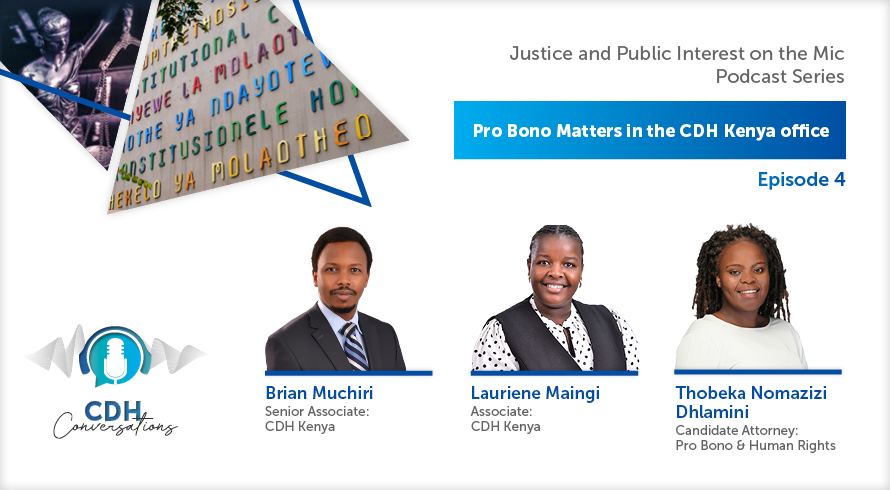Considerations when tendering in Africa
Cliffe Dekker Hofmeyr, in partnership with the DLA Piper Africa Group, of which we are a part, has been active in the African market, tendering for government work for a number of years. Our focus has been on southern and parts of central Africa (the English speaking parts), and also East Africa and occasionally Ghana and Nigeria in West Africa.
In the past, tender opportunities arose because we were approached by large financial or engineering firms to partner with them. Now, with our business development team constantly looking for opportunities, we are a lot more proactive. We pitch for many World Bank sponsored tenders because we know that is where the funding is available.
Our experience has been that going in “cold” (with no track record or existing connections) with regards to responding to advertisements or tender invitations, dramatically reduces the chance of successful bids.
While most African countries follow a formal tender process, as part of that process one needs to have an existing relationship with people in that institution. It’s not unique to Africa, but the emphasis in Africa is on these relationships.
It can be difficult for us, as lawyers to establish these relationships, because we can’t be seen to be touting for work (this is against law society rules in this country). So we have had to look at ways to develop long term mutually beneficial relationships that are not about an immediate gain. Business relationships must be formed by for example, information sharing and mentoring in the respective countries.
Traditionally a lot of the accounting and engineering firms have a local presence in a particular country – all with the same branding and same name. Some law firms also have this but not nearly on the same scale, so it is more difficult to create that brand presence. We are lucky in that we are part of the DLA Piper Africa Group, which is an alliance of global legal practices in Africa. DLA Piper is well known and well respected in Africa and this brand presence can be very helpful in the tendering process.
My observations are that the large multinationals still carry a lot of credibility in Africa, not just for law firms, but also engineering or accounting. For large infrastructure tenders, it still preferable for African counties to go with an internationally recognised and based firm. In English speaking African countries, there is still a strong adherence to using English law firms.
We team up with local firms, our DLA Piper Africa alliance partners, because it makes sense in terms of fee proposal, and because it’s important from a liability perspective, we can’t sign off on the laws of another country. Often with the large infrastructure projects, there is a measure of regulatory work but we deal more with the commercial legal elements and leave the regulatory elements to the local firms.
We do a fair amount of tenders that are either financed or implemented by the World Bank and I have found that unless there is some kind of pre-existing relationship with the regional office of the World Bank, it is not common for the World Bank to award those tenders to law firms.
How the system works it is often ex-World Bank employees become consultants to the World Bank and they are the ones that are brought in to assist with legal aspects in large projects because they are considered to be more cost effective and are known to the World Bank. The World Bank prefers to employ individuals rather than law firms. However, we feel larger projects need a law firm with a pool of expertise. If the project is to move forward at a faster pace, one person can often not do it all alone.
Price is another critical aspect of the tender process. There is enormous price sensitivity in African government tenders. It is an exceptionally competitive market at the moment, especially in West Africa where there are a lot of European and English firms tendering for work. They are prepared to slash their fees to try and undercut the competition. Even though we are comparatively cheaper on the South Africa Rand, because of the dearth in project work in Europe, more and more European firms are looking for work in Africa. United States projects lawyers are also looking for infrastructure work – and are prepared to undercut to get it. We consider ourselves more competitive in the long term. We have same expertise plus a regional understanding and our prices are comparatively better. In African government projects however, there is often a perception that English and US firms are better and governments are prepared to pay extra to secure these firms.
While African governments must comply with their procurement laws, they tend to be more flexible than the World Bank, which is very strict with the tender process compliance. Most of the World Bank bid awards are confirmed in Washington – where they will check that there was no rigging or corruption. There is a less of a safety net within African governments and no external pressure by World Bank to show they have complied with their procurement policies.
So if one is on the ground in Africa, forming trusting business relationships with people in various countries, with a strong brand presence and strong local partners, all at the right price, these will aid bidding for African government projects.
The information and material published on this website is provided for general purposes only and does not constitute legal advice. We make every effort to ensure that the content is updated regularly and to offer the most current and accurate information. Please consult one of our lawyers on any specific legal problem or matter. We accept no responsibility for any loss or damage, whether direct or consequential, which may arise from reliance on the information contained in these pages. Please refer to our full terms and conditions. Copyright © 2026 Cliffe Dekker Hofmeyr. All rights reserved. For permission to reproduce an article or publication, please contact us cliffedekkerhofmeyr@cdhlegal.com.
Subscribe
We support our clients’ strategic and operational needs by offering innovative, integrated and high quality thought leadership. To stay up to date on the latest legal developments that may potentially impact your business, subscribe to our alerts, seminar and webinar invitations.
Subscribe




